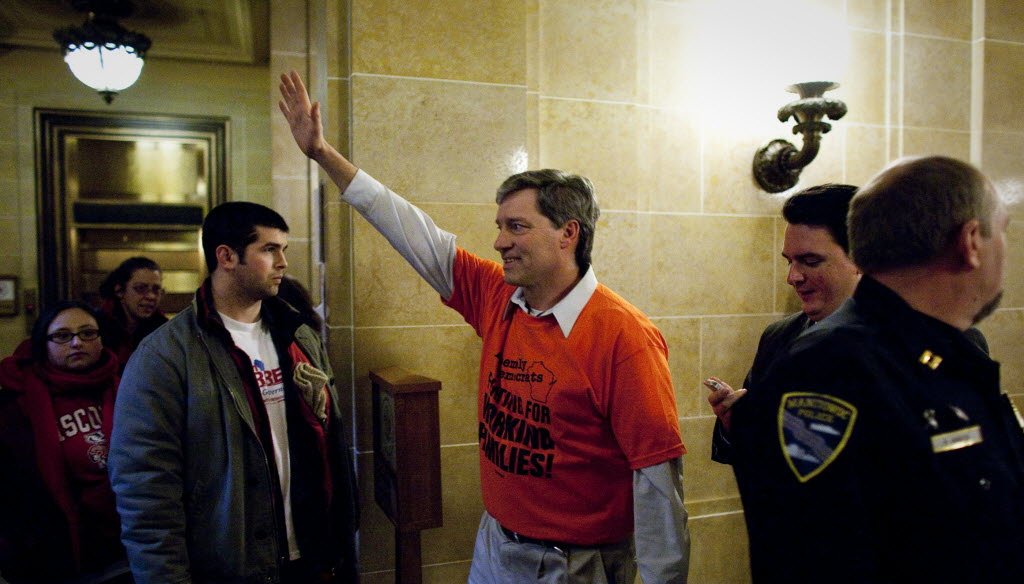



Wisconsin Assembly Democrat Brett Hulsey waves to supporters after he crashed Governor Scott Walker's press conference at the Capitol in Madison on February 23, 2011. JS photo
Democrat Brett Hulsey says that any union member who supports Mary Burke "is like a chicken who votes for Colonel Sanders."
Them’s fightin’ words -- and they’re aimed at a fellow Democrat vying to take on Republican Gov. Scott Walker in the November election.
Hulsey, a state representative from Madison and former vice president of a union local at a Sierra Club office, alleges outsourcing of jobs by Trek Bicycle when Burke was a Trek board member. Hulsey is also displeased with Burke’s support of a charter school in Madison, where she is on the school board.
But what really miffs Hulsey is Burke saying it was "reasonable" and "fair" for public employees to pay more toward their state-funded pensions and health insurance in 2011.
In his controversial move to sharply limit collective bargaining, Walker and fellow Republicans imposed those cost-sharing moves on state employees and cleared the way for local governments to do the same. It was part of the law known as Act 10.
Hulsey is accusing Burke of Walker-like anti-union behavior regarding those benefits and other issues. She supports "taking" public servants’ healthcare and retirement benefits, Hulsey claimed in a May 21, 2014 news release.
And in a letter to Burke in advance of the South Central Federation of Labor’s annual bean feed, a long-running celebration sponsored by the Madison-based labor union umbrella group, Hulsey wrote:
"You told the Milwaukee Journal Sentinel that you would have required workers to give up bargained for healthcare and retirement benefits like Gov. Walker."
Is Hulsey right?
Burke’s statements on Act 10
Burke, who entered the governor’s race in early October 2013, has been remarkably consistent in her comments on Act 10.
As support for his claim, Hulsey cites an April 18, 2014 interview with the Journal Sentinel in which Burke said she would work to restore collective bargaining for public workers while still seeking efficient government.
In the interview, Burke said: "If I had been governor I would have made sure I bargained for the changes that needed to be made to balance the state budget. I think it was only fair to ask for contributions to health care and pensions but I think those could have been negotiated, certainly firmly but fairly."
Walker’s approach, she said, left the state divided and has caused teachers and prospective educators to question whether salaries and benefits will be sufficient to support their careers and pay off student loans.
"Wisconsin walked away from the table and left it in a worse place," Burke said.
So, Burke staked out a somewhat nuanced position.
She defended getting public workers to pay more.
She said she’d have negotiated over the pension and health changes, in contrast to Walker’s approach of removing those as subjects of bargaining.
And she suggested she could have achieved a result similar to Walker’s by being firm in her "ask" for the benefits changes.
Could she have? That’s debatable. In 2011, some union leaders at one point said they’d agree to the benefits givebacks. But that was under extreme pressure because Walker had the votes for the stringent limits on bargaining -- and a ban on employers from deducting union dues from employee paychecks.
In any event, it’s clear from Burke’s comments that she wanted a similar result on pension and healthcare cost-sharing as Walker, but wouldn’t -- and couldn’t -- have "required" workers to pay more. That’s because, she said, she’d have negotiated to try to get that.
But her comments also suggest she would have made a high priority of getting those "fair" givebacks in exchange for something else.
Burke’s comments have been met with disappointment from some quarters on the left and among union leaders, but she’s received endorsements from the largest state employee union, major teachers unions and the state AFL-CIO.
They said her support is clear for collective bargaining, which she described as "something that I believe in and think is right for our state," in an appearance on The Devil’s Advocates radio show.
Meanwhile, Hulsey is making a full-throated pledge to try to repeal Act 10 as a whole, including the benefits cuts, saying the cuts were not necessary. He has pledged to provide back pay to workers whose wages declined because of the act.
Hulsey told us that Burke’s comments -- that she would have negotiated the benefits changes she needed -- amount to an approach that would have "required" the cuts of workers, "just in a more humane way" than Walker.
Our rating
Hulsey claimed Burke told Journal Sentinel reporters and editors that she "would have required workers to give up bargained-for healthcare and retirement benefits like Gov. Walker."
There’s an element of truth here in that Burke did say she backed benefits cuts in the same areas as Walker got, and was confident she could have achieved them.
But Hulsey’s phrasing makes it sound like Burke backs Walker’s approach. That’s a huge stretch given that she would have left collective bargaining intact and tried to negotiate the cost-cutting moves.
We rate his claim Mostly False.
Friends of Brett Hulsey, press release and letter, May 21, 2014
Interview with Rep. Brett Hulsey, May 23, 2014
Milwaukee Journal Sentinel, video of Mary Burke’s April 18, 2004, appearance at Editorial Board, published April 23, 2014
Milwaukee Journal Sentinel, video excerpt, Mary Burke comments on Act 10, published April 18, 2014
Email exchange with Joe Zepecki, Burke campaign spokesman, May 23, 2014
Today’s TMJ4, video, Mary Burke One-on-One with Charles Benson, Nov. 22, 2013
In a world of wild talk and fake news, help us stand up for the facts.
